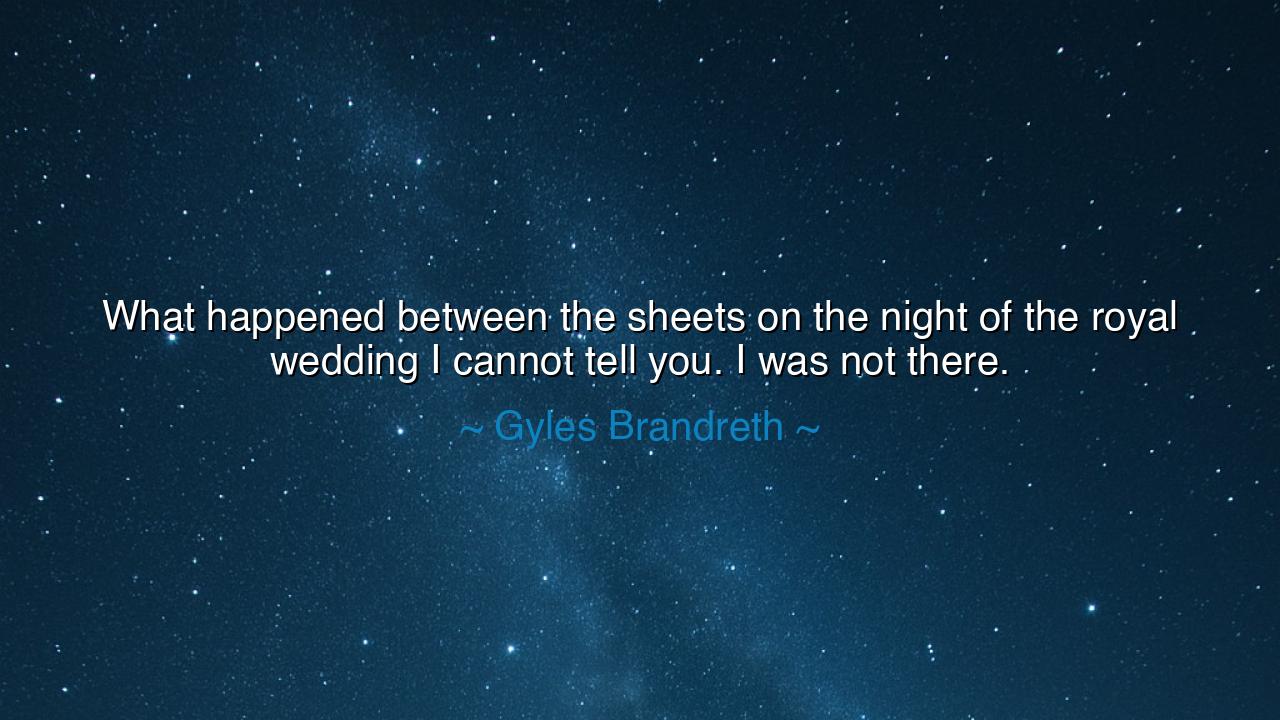
What happened between the sheets on the night of the royal
What happened between the sheets on the night of the royal wedding I cannot tell you. I was not there.






In the words of Gyles Brandreth—“What happened between the sheets on the night of the royal wedding I cannot tell you. I was not there.”—there is humor, but also wisdom. For he reminds us that while history may reveal the pageantry of crowns, the vows of the altar, and the pomp of ceremony, there are sacred chambers of life that remain beyond the historian’s reach. The royal wedding belongs to the multitude, yet the marriage bed belongs to the two alone. Thus, the line between public spectacle and private truth is drawn, and no chronicler may cross it.
The ancients, too, distinguished between the public and the hidden. The Romans celebrated marriages with feasts, torches, and songs, yet what transpired afterward, in the secret of the home, was veiled in silence. For they knew that a kingdom may be ruled from a throne, but it is sustained in the unseen intimacy of husband and wife. Brandreth’s jest therefore contains solemn truth: not all things may be known, nor should they, for mystery guards the dignity of love.
History abounds with speculation about such private unions. Whispers surrounded the marriages of Henry VIII, for in his chambers lay the seeds of divorce, death, and the birth of new faiths. Yet though the fate of nations turned upon his wedding nights, no one but the king and queen knew the true nature of those moments. Chroniclers could only guess, for even the most powerful monarchs remain, in marriage, simply man and woman, cloaked in mystery.
There is also in Brandreth’s words a reminder of humility. For the historian, the writer, the storyteller, must confess that knowledge has limits. To acknowledge, “I was not there,” is to honor truth itself, resisting the temptation to weave lies where silence is holier. In this humility lies integrity, the recognition that even in an age hungry for secrets, there are boundaries that must not be crossed.
Thus, let this teaching endure: not all that is unseen must be revealed, nor is every mystery meant to be solved. The wedding night, whether royal or humble, belongs only to those who live it, and its sanctity is preserved by silence. In this, Brandreth teaches us that wisdom is not only in what we say, but in what we choose not to speak, and that reverence for privacy is itself a noble act.






GDGold D.dragon
Gyles Brandreth’s comment on the royal wedding night is an interesting reflection on the fine line between humor and privacy. In today’s media landscape, is there any such thing as too much curiosity when it comes to public figures? Do we really need to know the intimate details of events like a royal wedding, or is this an unhealthy obsession with the personal lives of others?
TBNgoc Chu Thi Bich
Brandreth's lighthearted comment about the royal wedding night touches on the larger issue of public obsession with celebrity privacy. Why do we feel entitled to know intimate details about the lives of those in the public eye? Should the media and public shift focus to more meaningful aspects of a person’s life, rather than prying into personal moments? Is this curiosity inherently exploitative or just part of our nature?
KNGiai Ky Nguyen
Gyles Brandreth’s remark about not knowing what happened 'between the sheets' on the royal wedding night is both playful and thought-provoking. It raises questions about how much we, as society, expect from our public figures. Should we be so fixated on the private aspects of their lives, especially when we should be respecting their boundaries? What does it say about our obsession with celebrity culture?
CANguyen Khanh Chi A
I find Gyles Brandreth’s comment about the royal wedding night both humorous and insightful. It highlights the tension between public interest and private matters. Do we have a right to know everything about public figures, or is there a point where we need to acknowledge their right to privacy? How much of the fascination with royal weddings is driven by the desire for scandal versus genuine celebration?
NATran Ngoc Anh
Gyles Brandreth’s quote about the royal wedding night raises an interesting point about public curiosity and privacy. Why are people so fascinated by the details of such private moments, especially when it involves public figures? Shouldn't there be more respect for the privacy of individuals, even those in the spotlight? At what point do we cross the line between curiosity and intrusion into someone’s personal life?